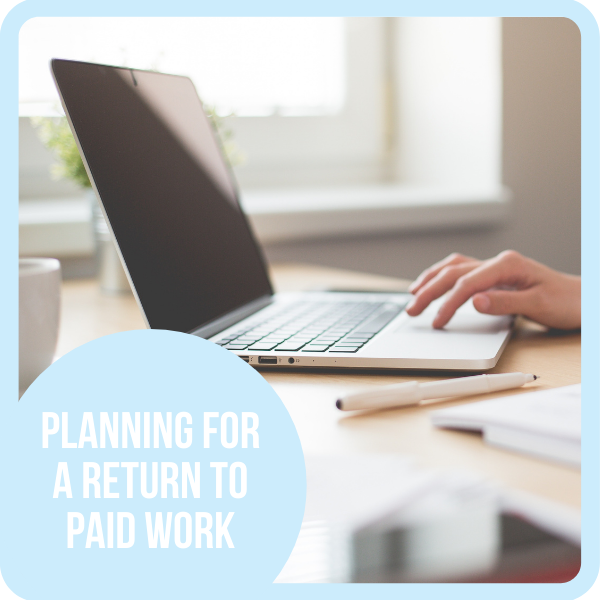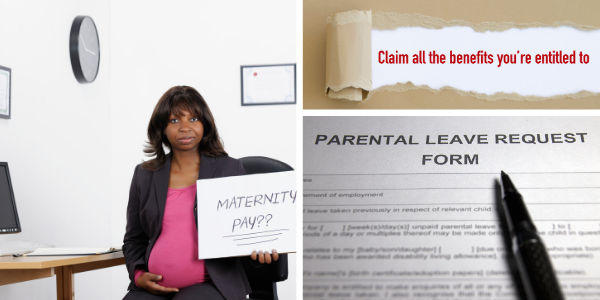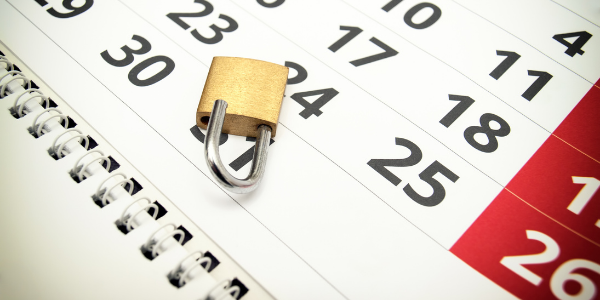Planning for a Return to Paid Work Work / Play / Leisure Suitable for stages: Pregnancy, 3 - 6 Months, 6 - 12 Months, 12 - 18 Months, 18 - 24 Months


Making a plan around returning to work after a maternity leave period has two distinct phases. The first occurs during your pregnancy when you are applying for maternity leave or making preparations for your leave (known as a 'confinement' date). The other is when it is time to make preparations for returning to work in the months leading up to your planned return to work date.
The choices you make during your pregnancy will be based on what you expect life as a mother will be and the options available to you financially and from your current employer. It is a big ask for your pregnant self to make a decision for your future mother self. If you can, it is recommended to build a level of flexibility into your return to work plans - that way, you can delay the decision to a time when you can make a fully informed choice.
Making work choices whilst pregnant
If you are in employment, the decision on when to start your leave and when to return to work post-baby can be a big one. Unfortunately, some people don't have many choices due to financial reasons, especially in places like the United States where maternity leave entitlements are few and far between.

Wherever you can, depending on how your body is handling the pregnancy, make the choice that is going to give you a buffer for some rest before your birth and plenty of rest after your birth. Since you don't necessarily choose what day you give birth (even with a planned C-section, your body may start labour early) and the estimated due date is very rarely the actual due date, this can be unpredictable. It helps to not take your expected due date too literally and apply more of an expected due time or month. That way, your expectations and plans will be more realistic.

It is important early on in your pregnancy to do a self-audit of your work duties and figure out if there are any health & safety risks involved in what you do. It is worth knowing what your entitlements as a pregnant employee (according to Fair Work Australia) are including how to ensure you are safe in your job during your pregnancy and according to the policies of your organisation. Safe work have pregnancy information relating to OHS and the Mayo Clinic have some additional do’s and don’ts for working during pregnancy.
Due to the changes that are happening in your brain and the energy going towards your body changes, you may have difficulty concentrating or remembering things. Go easy on yourself and if you need to, set yourself extra reminders, keep a diary or a planner and write things down on a to-do list. If you are tired, rest and get to bed early. The first and third trimesters can be the most tiring so be kind to yourself and don’t expect too much of yourself. It might help to listen to the Planning with Kids Podcast: why productivity is more than time management and check out this related link to find out more about time management including how your energy, time and attention are related to productivity.
For many women in Australia, their work entitles them to a 12 month paid maternity leave and/or a parental leave government benefit. It can take some planning and figuring out your entitlements, but it can be worthwhile to give you the financial breathing room to enjoy your time getting to know your baby.

If you can, keep your return date to work loose, it can also keep your options open if your future mother self wants to make a decision that is different to what her pregnant thought she knew. If you have to let your work know a return to work date, find out what flexibility options you have and the notice period you need to give if you have to make a change to either delay or bring forward the date.
This is a time to think and be realistic about how your life will change when your baby arrives. To work this out, take time to first listen to the wisdom or experiences of female influences in your life or seek this out from other trusted sources. This is the first step to work out your postpartum plan which is as important or more important as any birth plan.
You might ask yourself…
- When I finish work how will we manage financially and for how long can we manage?
- What help and support might I need and when?
- Am I prepared to accept the care and assistance from others?
- Where can I get that assistance - family, friends and/or paid services (cleaning, childcare or meals services)?
- What are the things that I need to care for my baby?
- How to I best set up my family home so everyone is happy, healthy and safe?
Making work choices as a new mother
You may have had an idea in your head of what life would be like as a stay at home parent. Whatever you thought, it is certainly no holiday - life is busy with a baby! It's a huge adjustment to get used to.
Well before the time that you are due to return to work, there is a lot of preparation that has to happen - working out childcare arrangements, preparing for the transition to childcare, figuring out adjustments to feeding arrangements and the mental and emotional preparation for being away from your baby. Separation anxiety can work both ways. It is worth being aware of the developmentally common peak ages for separation anxiety for your baby to help you work with their needs.

The whole range of emotions can be experienced when preparing to return to work - excitement, guilt, worry, and sadness is just the start. You can be looking forward to it and dreading it at the same time. The complexity of navigating another big change and mixed feelings can leave you stressed out and anxious. On the other hand, others will just stride through without skipping a beat - or maybe it just looks that way from the outside looking in. The point is that every mother and baby pair is different, so comparing yourself to others will be a waste of your energy.
Some people may adjust their return date depending on how they are feeling - some may return earlier than planned, others delay their return date where they can afford to, opting for unpaid leave. Try to keep an open mind to your options and do what feels right for you and your baby.

If you can afford to and you want to, take the pressure off yourself to return to work sooner rather than later. Your baby's first years are just a tiny chunk of time in the scheme of your entire life and working career. Sacrificing income and career progression in the short term could be worth the extra time you get to spend with your baby during their formative years. You can learn so much about yourself through caring for them and you get to be there as a consistent caregiver for them.
Some mothers may worry about being out of the workforce has deskilled them or they have missed out on keeping up with the market trends. The opposite may actually be true. Your mothering journey has the effect of upskilling you in the game of life. So many mothering skills have trained you in many transferrable job skills such as flexibility, quick thinking, interpersonal skills and time management. Be proud of how you have changed and give yourself credit that you are no the same person that you were before you had children.

On the other hand, if you have trusted caregivers such as grandparents waiting to step in to take your baby while you return to a career that fills your cups, both you and your baby may be far better off making that change.
Many workplaces offer flexible work arrangements such as shorter working days, delayed start time or early finish time, job sharing or extended part-time hours until your children are school-aged (such as in the public sector). It's worth putting some thought into and getting creative about seeking work arrangements that will suit you, your baby and the workplace.

It is certainly one of those huge transitions in the parenting journey that many women have written about after experiencing difficulties and coming out of it with wisdom to share. Luckily for you, there are tons of resources available to help you work out when and how to return to work:
- Fair Work - Returning to work from parental leave
- Books such as Work. Pump. Repeat by Jessic Shortall
- The Australian Breastfeeding Association -Returning to work & Breastfeeding resources
- Websites such as https://www.workingmumma.com.au who offer resources including a free e-Book 'Successfully Return to Work after maternity leave' and host the Working Mumma podcast
- Raising Children Network - work & child care - resource articles including returning to work, choosing and organising child care, starting and settling into child care.
- CareforKids.com.au - help to find the child care you need.
- Gidget Perinatal Support Centre Powered by Sonder is a 24/7 safety and wellbeing support service, linking expectant and new parents to a dedicated support centre via an app. All expectant and new parents who reside in NSW, as well as all Gidget Foundation Australia NSW clients, are offered access to Sonder. Check out their website for information about downloading the app and how to get started.
Work towards the outcome where you are the best mother you can be and towards meeting your baby's growth and development needs. It's not easy but whatever you do, it's important to make the best of it.
If you know of any other great resources for planning to return to work or to help with the transition back to work and keeping the balance between your mother and working roles, please add a comment and we will update this article with your suggestions.
Please note: Above all, any information on this website aims to provide general ideas for informational and educational purposes only. We encourage users to investigate several information sources, including, where necessary, independent individualised medical advice before making any decisions that could affect you or your child’s health or wellbeing.
* BabyPeg participates in various affiliate programs and may earn a commission for referring our users through the links provided. This is at no additional cost to our users. We take great care in choosing products and services which align with the mission of promoting better health and wellness for our BabyPeg community. Where possible, products are tried and tested by us. To continue to provide BabyPeg as a free service and reach as many parents as possible, we appreciate your support in using the link provided to purchase if you decide the product is right for you.








